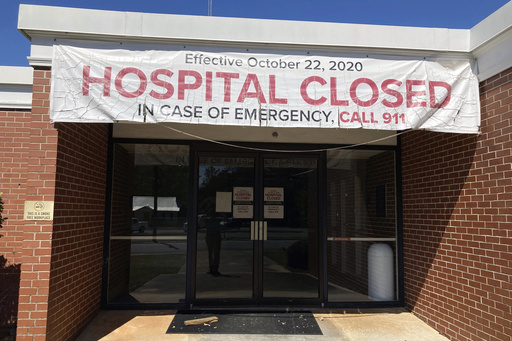ATLANTA (AP) — Georgia’s house speaker cracked open the door to Medicaid expansion in the state, but now that door appears to be closing for 2024.
A bill introduced Tuesday by a top lieutenant to Republican House Speaker Jon Burns proposes to create a Comprehensive Health Care Commission that could clear the way for more health coverage in the future, but not this year.
Supporters of Medicaid expansion had already concluded that the odds were growing long for 2024, with more than half the legislative session having elapsed without a proposal being introduced by Rep. Butch Parrish, the Swainsboro Republican that Burns appointed to lead the discussions.
Republican Gov. Brian Kemp’s decision this month to sue the federal government to try to extend the life of his Georgia Pathways program was widely seen as a sign that he opposed an expansion of health care coverage. Georgia Pathways offers coverage to able-bodied adults earning up to the poverty line — $14,580 for an individual or $24,860 for a family of three. But people must document 80 monthly hours of work, study, rehabilitation or volunteering to be eligible.
Only 2,350 people enrolled in the program from July 1 to mid-December, far fewer than the 100,000 that the Kemp administration projected the program might cover. It would expire in 2025, but Kemp sued to extend it to 2028.
After North Carolina began offering Medicaid to uninsured adults on Dec. 1, there are 10 remaining states that don’t cover people with incomes up to 138% of the federal poverty line. More than 430,000 uninsured Georgia adults could gain coverage if Medicaid is broadened, health research group KFF has projected.
“The governor’s getting entrenched,” said House Minority Leader James Beverly, a Macon Democrat. “In suing the federal government and in his continuing to say Pathways is the way, 500,000 Georgians are being left without health care for another year. And that’s a tragedy.”
Burns, a Newington Republican, said in a statement that he continues “to be 100% supportive” of Pathways but that Georgia should explore other options in case Kemp doesn’t win his court case. Burns has voiced support for using Medicaid money to buy private coverage for residents, as Arkansas does, a route that could boost payments to hospitals, doctors and other medical providers.
The speaker said that because Pathways could expire in 2025, “we also want to take the time to gather the facts, hear from policy experts and stakeholders, and craft the best policy possible to support our low-income, uninsured population across the state, which will help patients and providers alike,” Burns said.
Advocates called on lawmakers to keep working on expansion this year.
“There are people being diagnosed with cancer today who can’t wait for treatment,” Julie Vojtech, government relations director for the American Cancer Society Cancer Action Network, said in a statement. “It’s important we keep all options open and on the table during the 2024 legislative session.”
The group brought dozens of cancer patients, survivors and their family members to the state Capitol earlier this month to rally for Medicaid expansion, called on lawmakers to keep working expansion this year.
Supporters had hoped the state Senate might explore Medicaid expansion in exchange for reducing or eliminate permitting requirements for hospitals and health services. That’s been a top priority for Lt. Gov. Burt Jones, the Republican who presides over Georgia’s Senate, while the House has balked at loosening certificate of need rules.
Parrish’s bill proposes an incremental loosening of certificate of need standards. Most importantly, it removes dollar caps on how much existing hospitals can spend on new or remodeled buildings or new equipment, as long as they’re not offering new services. It also loosens rules on hospitals adding new beds, and lets them relocate up to 5 miles (8 kilometers) away without a new permit, up from the current 3 miles.
The bill would let new hospitals be built in counties with less than 50,000 residents, as long as they agree to provide a certain amount of charity care, join the statewide trauma system, provide “comprehensive behavioral health services” and agree to serve as teaching hospitals for medical students.
A standoff between Jones and Burns last year partly revolved around a plan to build a new hospital in Butts County, where Jones lives. The existing hospital there opposes the plan.
But Parrish’s measure would still require a state permit to offer new service, a safeguard many hospitals say is needed to prevent new operators from skimming off the most profitable services.
Jones said in a Tuesday statement he was “glad to see the House take up this effort to increase competition in the health care marketplace and reduce costs for Georgia families.
___
Associated Press writer Sudhin Thanawala contributed.


